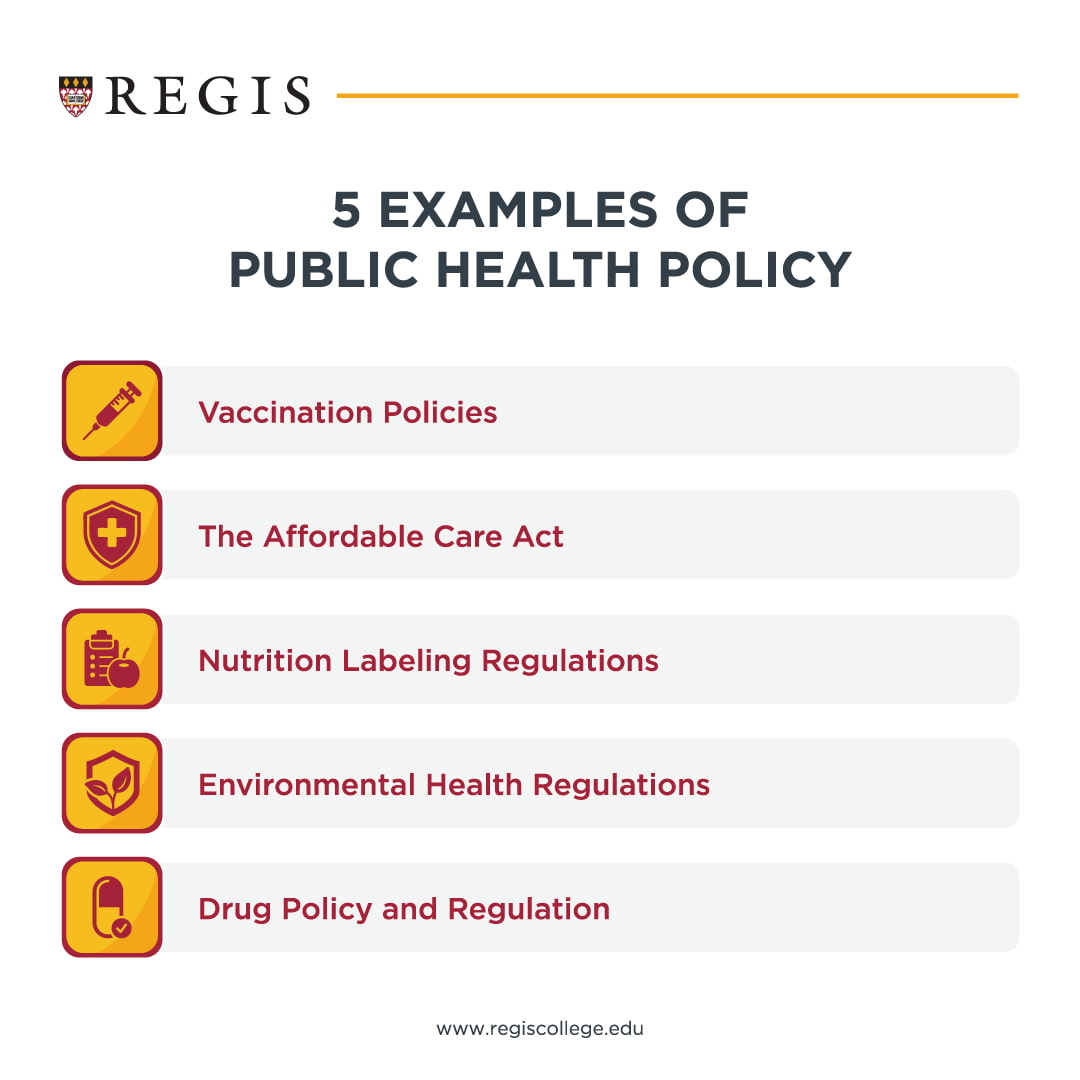Public health policy shapes the way we access healthcare, clean water, and life-saving vaccinations. If you're passionate about making a real difference in your community, understanding these policies is the first step toward becoming an advocate for change.
If this sounds interesting, read on to learn more about the importance of public health policy and how you can become a public health advocate.
Key Takeaways
- Public health policy plays a vital role in shaping healthcare systems, preventing disease, and ensuring equitable access to medical resources.
- Effective public health policies can help prevent disease outbreaks, protect vulnerable populations, and promote healthier communities through legislation, education, and advocacy.
- Key components of public health policy include legislation and regulation, public health programs, disease prevention strategies, and policy research.
- Examples of public health policies include vaccination mandates, nutrition labeling regulations, environmental health laws, and drug policies that safeguard public well-being.
- Influencing public health policy requires action, such as staying informed, engaging with the community, communicating with policymakers, and using digital platforms to raise awareness.
- Pursuing a career in public health policy through a degree program, like an MPH, can provide the expertise needed to drive meaningful change in public health initiatives.
What is Public Health Policy?
Public health policy includes the laws and regulations that shape how we prevent disease, promote well-being, and ensure equitable healthcare access. According to the Centers for Disease Control and Prevention, these policies are created by governments and institutions to address public health challenges and protect communities.
Why is Policy Making Important?
Policy-making is essential in public health because it establishes the legal and structural framework needed to address health challenges at a systemic level. Policies help shape healthcare access, disease prevention strategies, and public safety measures as well as provide a foundation for responding to emerging health threats and ensuring that healthcare systems remain effective and equitable. Without effective public health policies, any efforts to protect and enhance community health would be disjointed.
“Policy guides what we receive as healthcare, with a focus on prevention and education,” says Dr. Gayle Jones, a subject matter expert on public health.
Effective public health policies can help:
- Prevent the spread of diseases
- Protect vulnerable populations
- Create environments that support healthy lifestyles
- Ensure equitable access to medical resources

Public health policy encompasses several critical elements essential for fostering and executing effective public health initiatives. Here’s an overview of what those components are.
Legislation and Regulation
Legislation isn’t just the foundation of public health policy. It also establishes the necessary legal framework that impacts the decision-making around public health initiatives.
This legislative process involves several parties at different levels (e.g., local, state, and federal), including:
- Stakeholders from the community
- Politicians
- Legislators
- Healthcare providers/administrators
For public health professionals, navigating this landscape is crucial to successful public health policy formulation and implementation.
Public Health Programs and Services
Public health policy often comes in the form of various programs and services. Some common examples include vaccination programs, health education campaigns, and community classes on common health issues in that population.
While most communities have public health programs and services, they’re often impacted by the populations they serve.
“If you're looking at the local level, your health department will have policies about how they conduct the services they provide,” Jones says.
Health Promotion and Disease Prevention
The most well-known aspect of public health policy is the promotion of overall health and disease prevention. These are strategies designed to promote healthy lifestyles and environments, like anti-smoking campaigns, nutritional education programs, and exercise initiatives.
These strategies and policies constantly change in response to emerging health trends, new research findings, and changes in societal behavior.
“You're trying to find an answer to problems that are constantly changing due to the diversity of the populations. While the diversity is beautiful, it is also challenging.”
This dynamic nature ensures public health promotion programs remain relevant and effective in addressing current health challenges.
Policy Analysis and Research
Ideally, public health policy should adapt to accommodate the constant changes in populations and lifestyles. Since the effectiveness of these policies can vary based on demographic and geographic data, policy analysis and research provide necessary insights to help inform, shape, and evaluate public health policies.
This ensures that decisions made in the future are based on evidence, which can enhance their potential to effectively address the unique needs of different populations.
Examples of Public Health Policy
To understand the practical impact of public health policies, it's important to consider their real-world applications and outcomes.
Here are some common examples of public health policies in action.

Vaccination Policies
Vaccination policies play a critical role in public health by mandating immunization against infectious diseases like measles and polio to prevent public outbreaks. Beyond mandates, these policies also guide the development, approval, and distribution of vaccines for emerging health crises—such as the COVID-19 pandemic.
This ensures that vaccines are not only effectively developed but also equitably distributed to manage outbreaks and pandemics that could not be preemptively stopped.
Affordable Care Act
The Affordable Care Act (ACA), enacted during the Obama Administration, has extended affordable health insurance coverage to more of the population. By lowering the cost of health insurance, the ACA has increased access to preventive care services—including screenings for conditions like breast cancer.
Nutrition Labeling Regulations
Nutrition has been a focal point of public health policy—particularly in recent years. These policies often focus on food manufacturing labels, including calories, fats, sugars, and vitamins.
This gives consumers the information needed to make informed choices about their diets and encourages the consumption of more nutritious foods. It also leverages public education campaigns that promote a balanced diet in underserved areas.
“You want to draw people's attention to what they are eating and how it's impacting them,” Jones says.
Environmental Health Regulations
Environmental health is another major factor that’s included in public health since the environment can play a major role in impacting the population’s health.
Some examples include laws aimed at:
- Reducing pollution
- Protecting natural resources
- Preventing diseases caused by environmental factors
Through targeted environmental public health policies, communities can embrace a more holistic view of public health and wellness.
Drug Policy and Regulation
Drug policies balance the many benefits of pharmaceuticals and substances with potential public health hazards. The regulation of the use, sale, and distribution of these drugs is essential for safeguarding community public health.
A notable example of legislative action in this area is the 2024 Office of National Drug Control Policy (ONDCP) Reauthorization Act. This bipartisan bill strengthens federal efforts to combat drug trafficking and substance abuse by extending key programs such as the High Intensity Drug Trafficking Areas (HIDTA) and the Drug-Free Communities (DFC) initiatives through 2031. This effort displays the ongoing commitment to addressing the opioid crisis and preventing illicit drugs from entering the country.
How to Influence Public Health Policy
If you’re interested in working in public health policy, it’s important to understand how to positively influence this aspect of public health.
1. Stay Informed
First and foremost, it’s important to stay informed on the latest trends and top challenges in public health policy, including:
- Time: Federal policy-making can be slow due to procedural requirements and the involvement of many stakeholders.
- Funding and resource allocation: Implementing public health policy requires significant resources, making the allocation of these resources a persistent challenge.
- Political and economic influences: The influence of politics is significant due to the fact that public health adheres to the guidance of political figures.
- Public resistance: Public health policy's success hinges on public acceptance and cooperation.
- Health inequities: Health inequities refer to systematic disparities in access to health resources across different populations, which leads to unjust health outcomes.
You can do this by reading articles, watching the news, and regularly checking reputable sources online.
2. Engage with Your Community
Influencing public health policy often starts with grassroots efforts within your own community. So one of the best ways to get involved in this movement is by participating in local health initiatives.
“If you're trying to get involved in policy, then you have to get involved in your community,” Jones says. “You need to be able to communicate what the issues are, and be able to offer potential solutions.”
This can include volunteer opportunities focused on improving community health, such as:
- Local health fairs
- Vaccination drives
- Public health awareness campaigns
Engaging with local health departments or non-profit organizations can further amplify your impact, offering structured ways to become an advocate in public health policy.
3. Communicate with Policymakers
Given the significant influence of legislation and politics on public health, engaging with policymakers can make a huge impact. Writing letters, sending emails, or making phone calls to local and state representatives can help you actively advocate for changes in public health policy.
“If you're trying to influence public health policy, you have to say something,” Jones says. “You have to share your concerns, you have to start talking to your legislators, the people in your community who represent you, the organizations that are involved, and you have to be willing to share your experience.”
4. Use Digital Platforms
Digital platforms, like social media, are great tools for raising awareness and garnering support for public health policy. Leveraging these platforms with accurate information is crucial for keeping communities informed and educated about current public health trends.
“Information has to be reliable and valid,” Jones says. “You cannot, as a public health professional, just start talking about anything you want without having valid resources. However, it is vital that the information that you're sharing is accurate.”
Make an Impact as a Public Health Professional
While anyone can influence public health policy, the best way to make a significant impact is to become a public health professional. In order to do so and work in the public health sector, you’ll need to earn a degree in public health to learn the skills needed to effect lasting change.
Regis College's Master of Public Health (MPH) degree program equips future public health leaders with the skills to shape policy and create real change. This valuable curriculum will provide the knowledge needed to effectively advocate for health equity, design impactful policies, or lead community health initiatives.
“When teaching public health policy, I let the students select what they want to research and discuss because I want them to engage in an area that is interesting to them,” Jones says.
This approach can help shape students into passionate public health advocates, ready to transform the world into a healthier, happier place.




